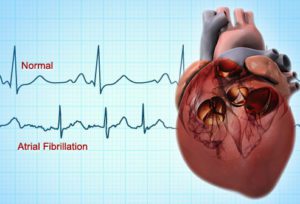 The heart is composed of four chambers. The upper chambers are called the atria and the lower chambers are the ventricles. There are two distinct systems which make the heart beat the way it should. The mechanical system which allows the heart to physically beat and the electrical or conduction system which sends electrical impulses to heart cells and tells the heart muscles to contract or beat. When these two systems do not work together heartbeat irregularities can occur, one of these irregularities is atrial fibrillation.
The heart is composed of four chambers. The upper chambers are called the atria and the lower chambers are the ventricles. There are two distinct systems which make the heart beat the way it should. The mechanical system which allows the heart to physically beat and the electrical or conduction system which sends electrical impulses to heart cells and tells the heart muscles to contract or beat. When these two systems do not work together heartbeat irregularities can occur, one of these irregularities is atrial fibrillation.
What is atrial fibrillation? Essentially it is a quivering or fibrillation of the atrial chambers of the heart. When fibrillation occurs the blood flow from the atria is compromised and not all the blood from the atria is pumped out. This can cause you to feel “fluttering” sensations in your chest. Because of lower blood flow from your heart you can also feel short of breath, especially with activity, tire more easily, feel dizzy or even pass out.
How is it treated? The most common treatment is oral medications which help slow the quivering of the atria and allow the normal beat to return. Other methods are also available which your
physician will discuss with you if oral medication is not successful or they feel other interventions are needed.
Why do I need to be on “blood thinners” if I have atrial fibrillation? Because the atria do not empty completely, blood can pool which can cause small clots to form. If these clots are pushed into your blood stream, they can block blood vessels and cause serious medical problems. These include strokes, “mini strokes” or TIA’s, blood clots in the lungs or clots to the feet and legs. You need to have regular blood work to monitor how “thin” your blood is a a regular basis.
When to call your doctor: If you notice your heart beating differently or you feel short of breath, especially with activity.
When to call 911 or go to the emergency department: If you develop chest pain or signs of a stroke which include slurred speech, one sided weakness, one sided facial drooping or loss of consciousness.
References: (Information): Andrade, J., Khairy, P., Dobrev, D., & Nattel, S. (2014, April 25). The clinical profile and pathophysiology of atrial fibrillation: Relationships among clinical features, epidemiology and mechanisms [journal]. Circulation Research. http://dx.doi.org/10.1161CIRCRESAHA.114.303211(Photo): webmd.com


